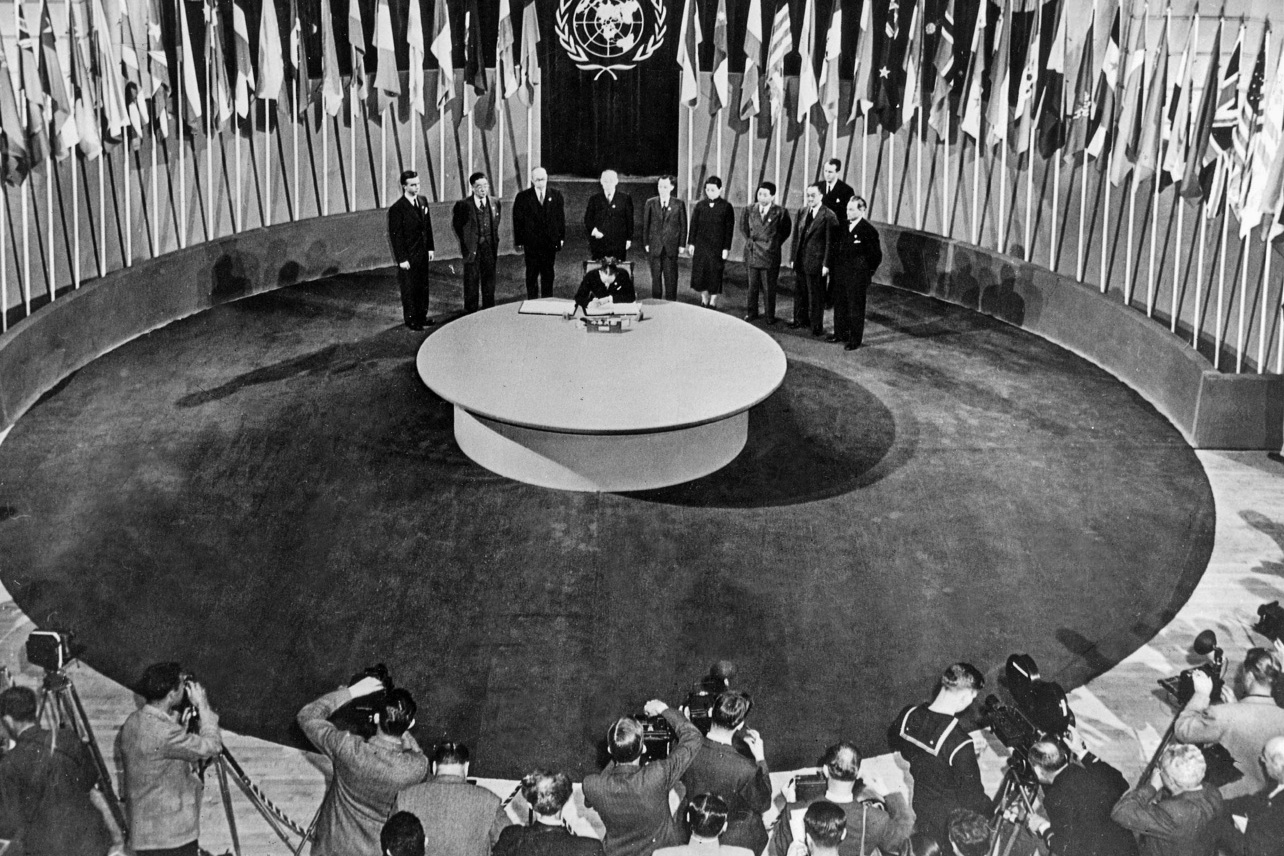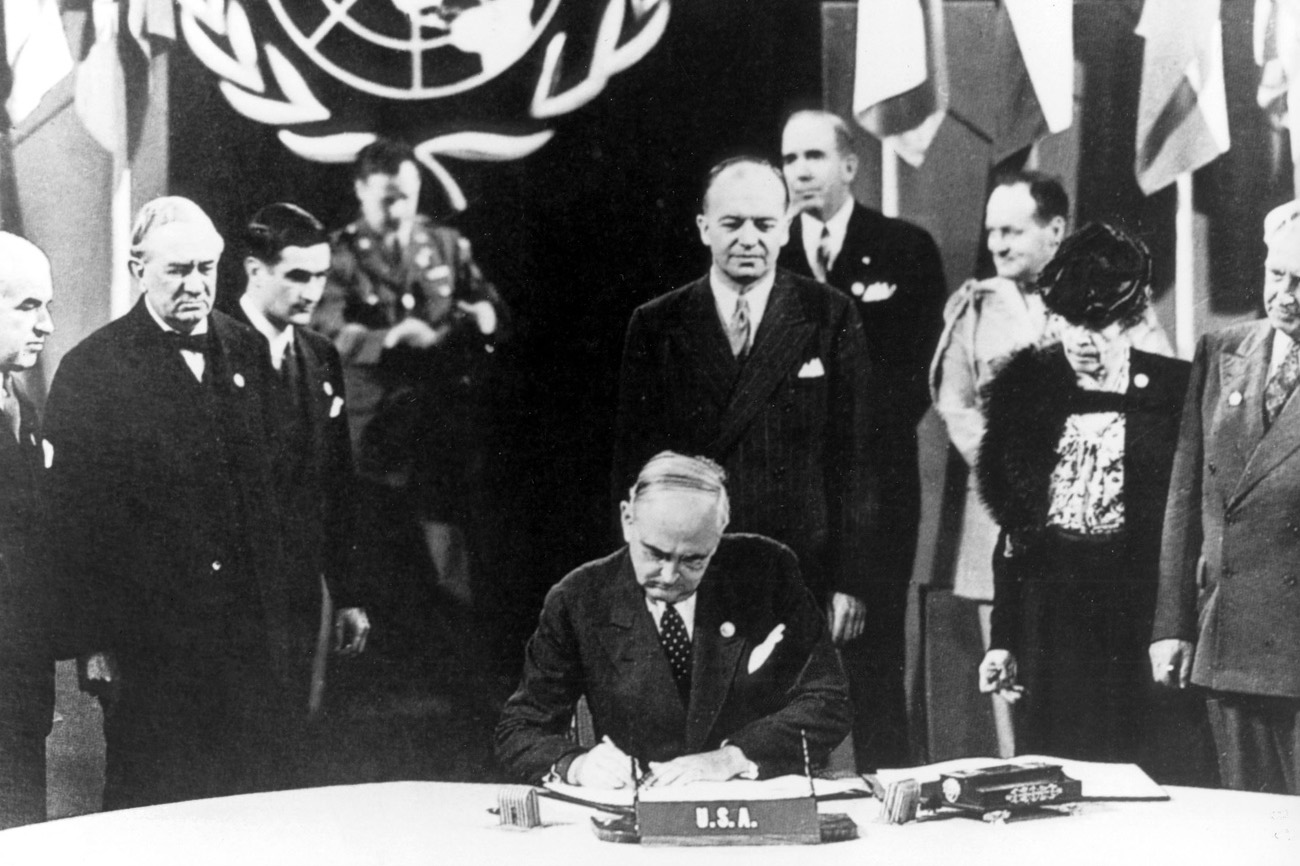
What remains of the UN dream 80 years after the Second World War?
The United Nations was born following the armistice of May 8, 1945, and aimed to establish lasting peace. Eighty years on, rising extremism and the return of open conflicts are challenging the international institutions that emerged after the Second World War.
On May 8, 1945, Europe celebrated the end of a nightmare. In Geneva, then dubbed “the city of nations”, jubilant crowds filled the streets. The German capitulation, signed on May 7 and 8 in Reims and Berlin, marked the end of hostilities in Europe.
“When the war ended, there was a feeling of total relief. You have to imagine five years of global conflict, 50 million dead, military operations in every corner of the planet, the genocide of the Jews, [and] atomic bombs,” Ludovic Tournès, a professor of international history at the University of Geneva, toldExternal link Swiss public radio RTS. A few months after the war, this unprecedented global conflict gave rise to a new international order.
From total war to rational peace
The trauma of this conflict revived an idea already formulated in 1919 with the League of Nations, founded in Geneva in the wake of the First World War: to regulate international affairs rationally, through a collective framework. On August 14, 1941, in the midst of the Second World War, British Prime Minister Winston Churchill and United States President Franklin D. Roosevelt signed the Atlantic Charter, a document setting out principles to guarantee peace and security in the world. This text inspired the Declaration of the United Nations, to which 26 allied countries signed up in 1942.
“Initially, the United Nations was set up to counter totalitarianism – Nazism and Fascism – with the idea that allied countries would not stop fighting until Nazism had been defeated,” explained Tournès.
It was these same countries that, a few weeks after German capitulation, met in San Francisco to officially found the UN. The UN Charter (also known as the San Francisco Charter), signed in June 1945 by 50 states, outlines an ambitious project to guarantee peace through cooperation, justice and human dignity.

Switzerland, because of its neutrality, did not actively participate in the founding of the UN, which it joined much later – in 2002, following a popular referendum.
In the minds of the founders, however, peace was not just the absence of war. “A world at peace was not just a world where international affairs were regulated by regular meetings, but also a world where everyone had access to health, work, and what was known then as a minimum standard of living,” said Tournès. The UN set up specialised agencies, such as the World Health Organization (WHO), based in Geneva.
Multilateralism under pressure
But 80 years on, all that was built seems to be faltering. The US under Donald Trump has withdrawn from the WHO and the UN Human Rights Council; the UN Security Council is paralysed in the face of the conflicts in Ukraine and Gaza; and there is a trade war, growing scepticism about UN institutions, and a liquidity crisis. “Donald Trump’s arrival in power is a break with 80 years of multilateralism,” said Tournès.
Johann Chapoutot, a professor of contemporary history at the Sorbonne and an expert in Nazism, shares this view. “After 1945, there was a desire to civilise the world – in other words, to make sure the world was governed by laws to avoid what had happened during two World Wars,” he said. “This consensus in the West was respected until recently. Now it has been broken.”
The end of a cycle?
Chapoutot thinks this erosion of multilateralism does not mark a new era, but rather the end of a conservative cycle that began towards the end of the Cold War. “I think we are at the end of a cycle, of a ‘conservative counter-revolution’ that began in the early 1980s with [President Ronald] Reagan in the United States and [Prime Minister Margaret] Thatcher in the UK,” he said. “And it is precisely because we’re at the end of this cycle that it is all the more radical and violent.”

This radicalism takes the form of “liberal-authoritarian” regimes combining economic liberalism and authoritarian power, according to the historian, who in his latest essay Les Irresponsables looks at what led to support for the far-right in Germany in the 1930s. “This alliance between cynical liberalism and the questioning of democracy is something we see every day on the world stage, starting with the United States,” he said.
As the world marks the 80th anniversary of the armistice against a backdrop of war and rising extremism, Chapoutot advocates keeping a cool head. “One of the tools of the far-right is to stupefy people with brutality, insults and lies,” he said, calling for a sharper critical eye. “History shows us that the far-right is certainly violent and loud, but that its leaders are incompetent,” he added. “Trump’s first term was a disaster. The second is heading in that direction.”
So, can the world learn lessons from a history that seems to be repeating itself? Nearly a century after the birth of the UN, multilateralism is being asked to reinvent itself in the face of echoes from the past.
Edited by Samuel Jaberg. Adapted from French by Julia Crawford/gw

In compliance with the JTI standards
More: SWI swissinfo.ch certified by the Journalism Trust Initiative


























You can find an overview of ongoing debates with our journalists here . Please join us!
If you want to start a conversation about a topic raised in this article or want to report factual errors, email us at english@swissinfo.ch.